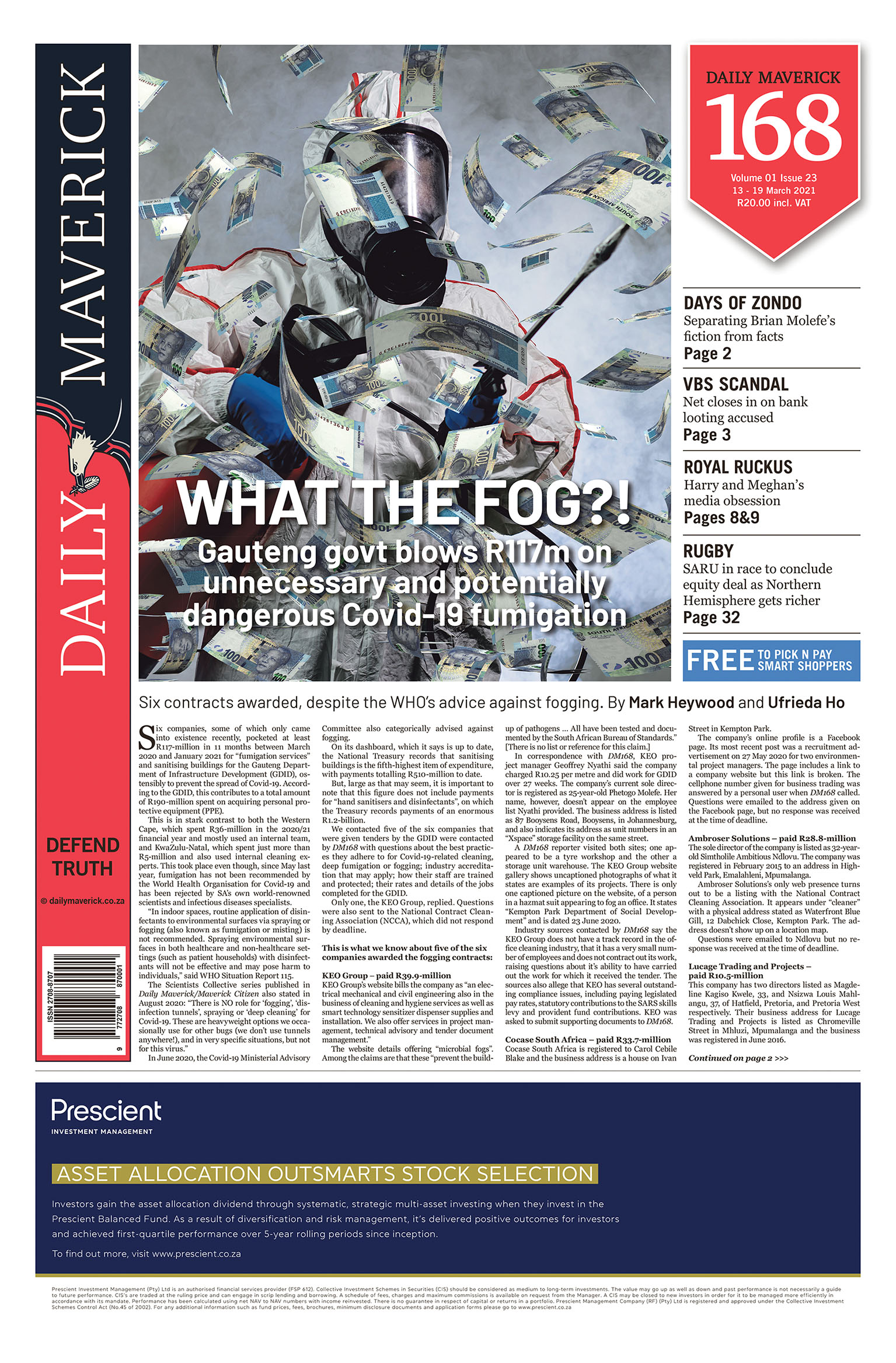First published in the Daily Maverick 168 weekly newspaper.
Set at a whopping R650.4-billion for the 2021/22 financial year, the public sector wage bill has become the largest component of government spending.
The government has allocated more money to remunerate 1.3 million public servants – just 2% of the population – than it has allocated for social grants to 18 million of South Africa’s most vulnerable people. Social grants will cost about R196-billion.
The enormous spending on salaries for public servants – including doctors, nurses, lawyers, teachers and police officers – cuts government’s ability to spend more on initiatives to boost economic growth and job creation.
Cas Coovadia of Business Unity SA and Busisiwe Mavuso of Business Leadership SA have warned that SA is “well on its way to becoming another failed African state” if it doesn’t tackle the public sector wage bill.
The government, it seems, is starting to listen. Finance Minister Tito Mboweni has reaffirmed the decision to implement a three-year wage freeze in the public sector to slash government spending by R300-billion and bring ballooning state debt of R3.95-trillion under control. This decision is being challenged at the Constitutional Court by trade unions representing public servants.
But how did the public sector wage bill get out of control? The government has itself to blame. It has been unable to resist out-of-whack salary increases for more than a decade of trade union negotiations.
The government’s financial year of 2006/07 was a turning point. It reviewed its remuneration policy across all three spheres of the state (national, provincial and local), and increased salaries with the intention of attracting and retaining skilled public servants such as doctors, lawyers, nurses and teachers.
To do this, the government introduced a system called occupation-specific dispensation in 2008/09, which awarded skilled public servants significant increases in their basic pay. The system worked in the government’s favour: it hired more skilled medical professionals (doctors) than ordinary public servants, administrators and policymakers. The number of public servants earning more than R1-million a year – mostly doctors – increased from 9,600 in 2006/07 to 29,000 in 2018/19.
Then the wage bill started rising, exploding from R154-billion to R650.4-billion by 2021/22. The main driver of the wage bill growth has not been the increase in the number of people hired by the state (1.2 million in 2006/07 versus 1.3 million in 2021/22). The driver is salary agreements in which basic pay has been adjusted annually at a rate higher than inflation.
According to National Treasury data, the average annual public sector remuneration more than tripled between 2006/07 and 2019/20, rising from R136,000 a year to more than R415,000. Treasury said this represents an increase of more than 45% after adjusting for inflation over the 13-year period. Using Treasury figures, this translates to a 205% increase when subtracting the difference between the average figures for 2006/07 and 2019/20 (R279,000) and dividing it by the average figure in 2006/07 (R136,000).
Along with unsustainable salary increase agreements with trade unions, the drivers of increases in the wage bill have been:
Salary increases because of public servants being promoted; and rapid growth of employment benefits, especially medical aid and the housing allowance.
Treasury’s definition of the public sector includes full-time employed workers in national and provincial government but excludes state-owned enterprises (they have separate payroll systems) and those employed through short-term contracts such as Expanded Public and Community Works Programmes.
In defending its decision to implement a three-year wage freeze, the government always cites the private sector, arguing that workers in the private sector don’t enjoy job security and often have to stomach wage freezes, cuts, or worse, job losses as a result of economic forces. Put differently, the pain should be distributed evenly.
It has also argued that remuneration for public servants tends to be higher than that of private-sector workers generally. According to Treasury, the average monthly salary in the public sector was R15,200 in the first quarter of 2010, compared to R11,200 in the private sector, rising to R33,200 and R22,000, respectively, in the first quarter of 2020.
A good thing about public sector remuneration is that salaries are distributed more evenly or equitably because income inequality – measured by a metric called the Gini coefficient – is lower in the public sector. The public sector Gini coefficient is 0.38, compared with more than 0.6 for the entire South African economy. A higher coefficient implies a more unequal distribution.
Salary agreements in the public sector have been structured in a way that ensures lower-income workers receive higher-percentage increases than more skilled workers, who fall into middle and higher-income categories.
For example, the average annual salary of workers in the lowest salary grade (called Grade 1 and comprising low-skilled general workers) increased by 3.2%, after adjustments to inflation, every year over 13 years from 2006/07 to 2018/19. In rand terms, the average salary of workers in the Grade 1 category increased from R89,705 in 2006/07 to R130,379 in 2018/19.
Meanwhile, workers in the higher salary grades (grades 12 to 16, including skilled workers such as doctors, lawyers, engineers and middle to senior administrators in different spheres of the state) saw their salaries grow by a slower annual rate of 0.6% to 0.7% over a 13-year period. DM168
This story first appeared in our weekly Daily Maverick 168 newspaper which is available for free to Pick n Pay Smart Shoppers at these Pick n Pay stores.

This article is more than 4 years old
Business Maverick
State tries to curb its spiralling R650-billion wage bill
Lower- and middle-income earners have driven the increase in the public sector wage bill. But the government has also employed more skilled professionals, especially doctors, accelerating its spend on wages.





